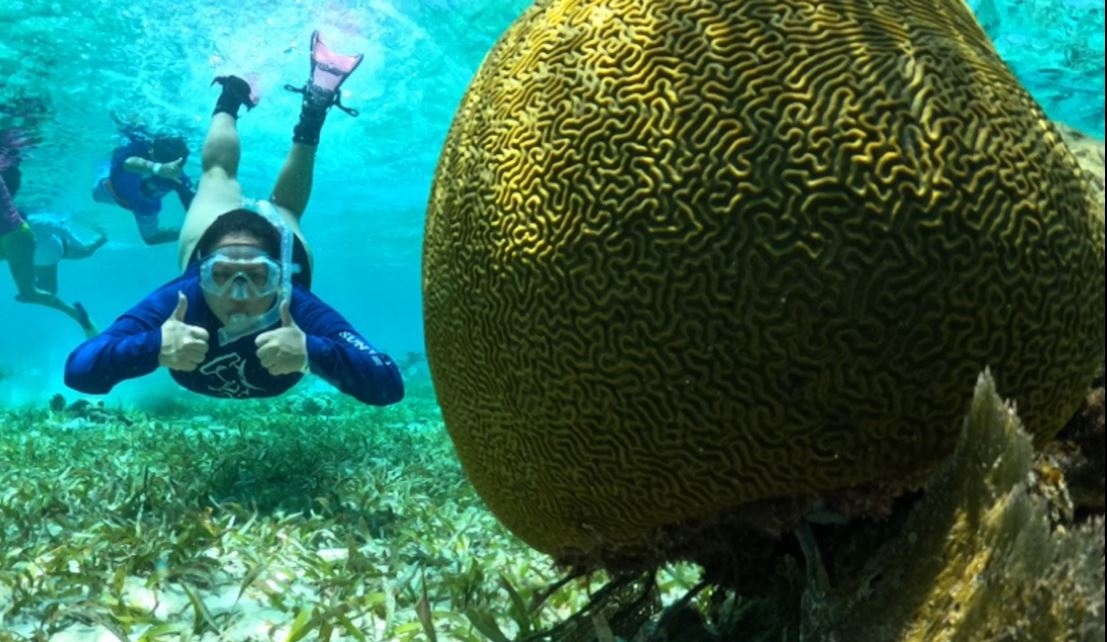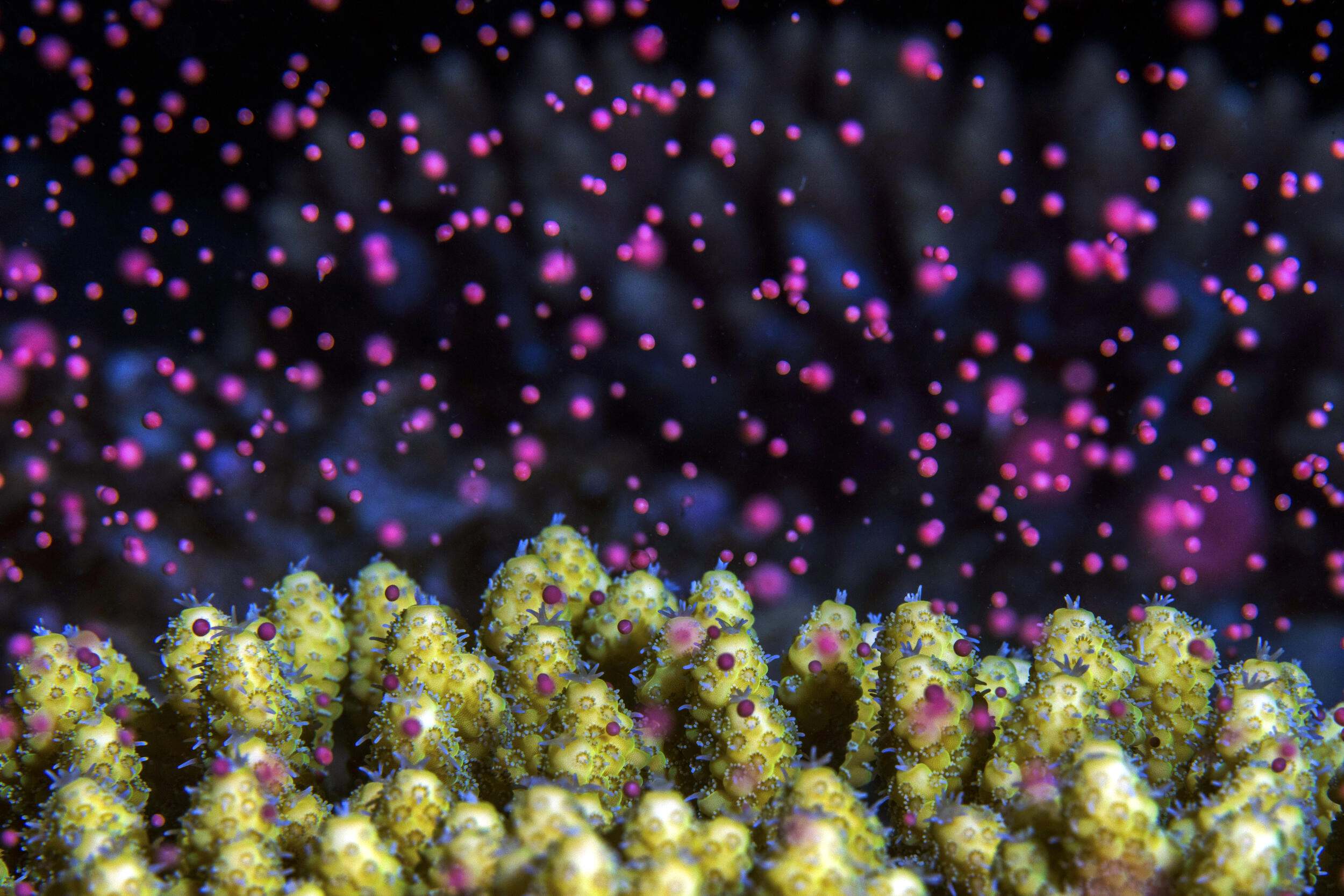Guardians Protect the Sea in Papua New Guinea
Location
Kimbe Bay, West New Britain, Papua New Guinea
The challenge
Papua New Guinea (PNG) is a country world renowned for high levels of biodiversity. The country is made up of twenty unique provinces, where five percent of the world’s species can be found in a wide range of terrestrial and marine ecosystems. However, due to increased anthropogenic and environmental pressures, the presence of these unique ecosystems is declining. With anthropogenic pressures, such as a rapidly growing population largely driving changes to the local environment, the challenge in PNG is educating local communities in order to help them better understand the impact of their actions and use marine and terrestrial resources in a sustainable manner.
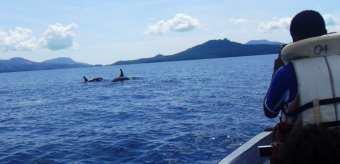
MEEP students on way to Restorf Island field excursion sighting orcas. Photo © Adolphina Luvongit/MND
Kimbe Bay, located in the West New Britain Province (WNBP) of PNG, is a large bay (140 km x 70 km in area) comprised of coral reefs, mangroves, seagrasses, and seamounts. Up until the 1960s, most of Kimbe Bay’s population was made up of traditional and indigenous groups who lived a subsistence lifestyle and engaged in cash cropping, e.g., cocoa and copra. In the late 1960’s Kimbe Bay witnessed the arrival of the palm oil industry which significantly altered the demographic and economic makeup of the area. Migrants from other PNG provinces arrived in the area as smallholder participants in the industry. Employment opportunities grew as the industry became successful and expanded. People born in other PNG provinces now make up a large percentage of the population of WNBP. In addition, pressure from overfishing and some destructive fishing methods continues to be an area requiring continuous community awareness education in Kimbe Bay.
Actions taken
In an effort to help preserve the local environment, in 1997, The Nature Conservancy, the European Union Islands Regional Environmental Program, and Walindi Plantation Resort worked together to form a small NGO known as Mahonia Na Dari (MND), or Guardian of the Sea in the local language. Operating from the Walindi Nature Centre in Kimbe Bay, MND strives to understand and conserve the surrounding natural environments for present and future generations living in Kimbe Bay and PNG. Hoping to build environmental and reef stewardship within the local community, MND developed an education and outreach campaign which includes a Marine Environment Education Program (MEEP), field excursions, and additional outreach activities.
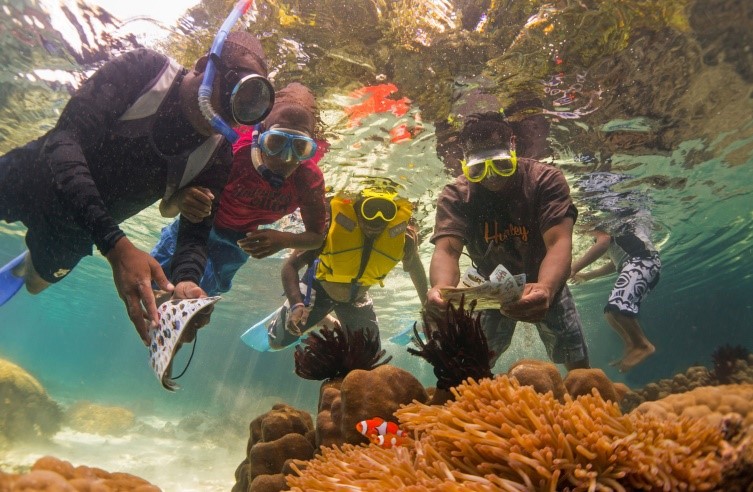
MEEP students on field excursion to Restorf Island. Note fish identification guides. Photo © Stefan Andrews
There are currently four programs targeting different age groups. In the Intensive MEEP, groups of twenty secondary school students spend nine to ten days in classroom and field sessions learning about reef biology, local environmental problems, and protection strategies. Students also get hands on experience with reef survey techniques and data collection. The Community Conservation Awareness Outreach Program conducted by the MND Education Officer and Marine Educators visit schools and communities surrounding Kimbe Bay. Junior MEEP, for elementary school students, includes activities such as storytelling, reef walks, and drawing. The five-day Teachers MEEP ensures critical knowledge is passed on to local Primary School educators via the MND-USAID developed MEEP Primary School Teacher’s Guide supported by six marine education posters. Due to the program’s effectiveness within the community, some activities have become an official part of school curriculum.
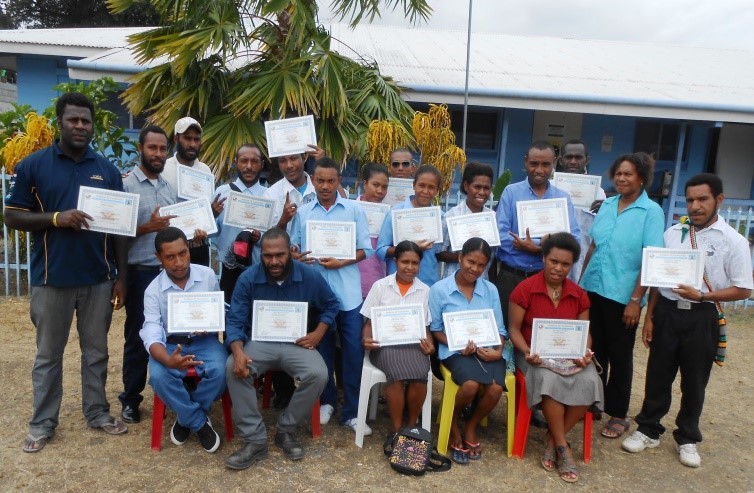
Madang Teacher’s College MEEP Training graduates. Photo © Adolphina Luvongit/MND
Hoping to expand their audience, MND encourages groups from anywhere in PNG or across the world to come to the Walindi Nature Centre for field excursions. While these excursions can take on many different forms depending on the requests made by the visiting group, they almost always include practical and hands on experiences with the surrounding coral reefs. By allowing diverse groups to stay and study at the Walindi Nature Centre, MND is disseminating knowledge to a global audience while simultaneously acquiring new knowledge from outsiders. MND works in close association with James Cook University (JCU), Townsville, Australia. JCU is a world leader in marine biology research sciences. JCU has had a base at Mahonia Na Dari Research and Conservation Centre since its inception in 1996.
While the MEEP and field excursions serve as a strong foundation for building community stewardship, one of MND’s most popular activities in the past has been a puppet show that toured local villages and schools as part of the Outreach Program. MND developed a puppet show providing an entertaining and educational way of sharing information. In the play, two characters cause trouble by using destructive fishing techniques and learn about how simple actions can affect the entire reef ecosystem. Since its inception, the puppet show has helped to effectively spread messages of conservation and sustainable reef management practices throughout local communities. In recent years, selection of a relevant annual theme has been made and taken directly to schools. Primary School teachers have been shown how to use the MND MEEP Primary School Teacher’s Guide supported by six posters. In addition, MND is now working on ways to engage students living with disabilities via the MEEP.
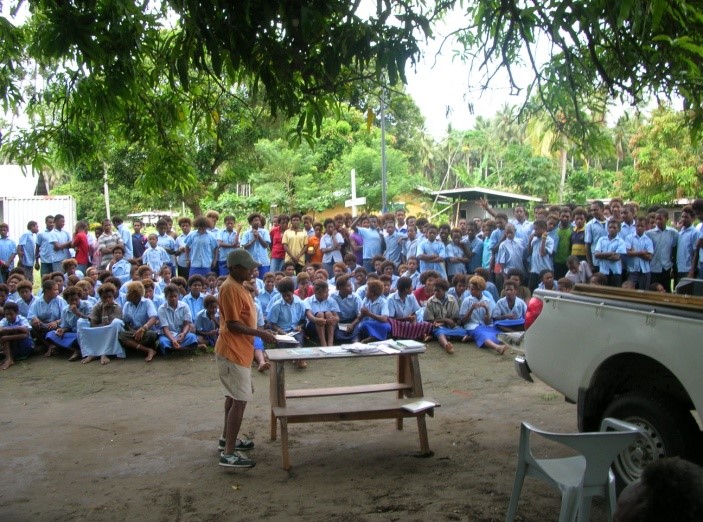
Primary School visits around Kimbe Bay. Photo © Francis Gove/MND
By involving a wide range of stakeholders, MND was instrumental in establishing one of the first community based marine reserves in PNG directly adjacent to the Walindi Nature Centre. Known as the Kilu LMMA, this area has become an epicenter for research in Kimbe Bay as annual concurrent studies have been conducted by JCU since 1996 giving the longest collection of such data in an LMMA anywhere.
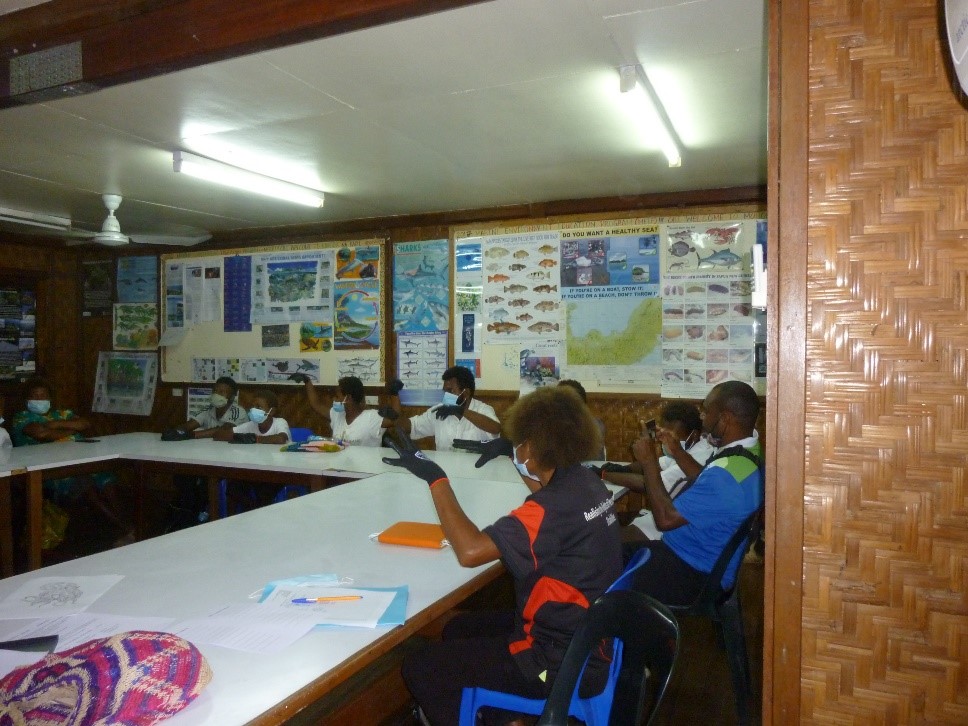
Students from Callan Inclusive Learning Centre Kimbe using sign language to participate in the Junior MEEP held at Mahonia Na Dari Research and Conservation Centre 2021 classroom session conducted at the NMD Conference Room. Photo © MND
How successful has it been?
The efforts of MND now reach more than 10,000 individuals each year on a face-to-face basis. The extensive education and outreach campaigns have helped to strengthen knowledge of marine and terrestrial ecosystems and built support for conservation in Kimbe Bay. Community members are able to gain an understanding of how their livelihood choices directly affect their surrounding ecosystems, while travelers from other parts of the world are able to learn about the conservation work of a small local NGO.
Lessons learned and recommendations
- Small NGOs can be effective and powerful.
- Identifying gaps of knowledge in the community and targeting that group may be most effective in continuing to spread knowledge.
- Creative outreach and education activities helped increase the success of the program, for example, puppet shows provided an entertaining and educational way of sharing information.
- Persistent and continuous reassessment of the effectiveness of different strategies is necessary to continue to engage communities through time. This comes via continuous community engagement.
- Baseline surveys at the onset of implementing a marine protected or a locally managed marine area provide a reference for comparison to future conditions.
- Engaging and developing a new audience such as students with disabilities based on MEEP has shown the adaptability of the program.
Funding summary
Past and Current Donors
New Caledonia Government
Swire Shipping
Australia Volunteer International
NZ Volunteer Services Abroad
Disney Worldwide Conservation Fund
PADI Foundation
WNB Provincial Governor Sasindran Muthuvel
WNB Provincial Government
New Britain Palm Oil Limited (NBPOL)
The Ocean Foundation
RV Alucia
Hargy Oil Palm Limited (HOPL)
UNDP – GEF – Small Grants Program
Democratic Governance Transition Phase (Australian Aid)
New England Aquarium Marine Conservation Fund
Roger Roth: Under Water Image
Australian Aid Incentive Fund
USAID
US Embassy Port Moresby
New Zealand High Commission: Head of Mission Fund (HOMF)
Pacific Development and Conservation Fund NZ
The Nature Conservancy
Walindi Nature Centre
Lead organizations
Mahonia Na Dari
The Nature Conservancy
Walindi Plantation Resort
Partners
Walindi Plantation Resort
James Cook University
New Britain Palm Oil Limited (NBPOL)
WNB Provincial Administration
Office of the Governor
Office of the Provincial Administrator
WNB Division of Education
Community Development
Schools within the Province Talasea LLG (Local Level Government)
Hoskins LLG
Bialla LLG
Council Ward Areas (Talasea & Hoskins and Bialla Districts)
Communities in Talasea & Hoskins and Bialla Districts
Swire Shipping
Kimbe International School
Mission Blue Hope Spot Kimbe Bay
Resources
Video on Mahonia Na Dari Marine Conservation Centre in Kimbe
Video of Mahonia Na Dari school camp snorkeling trip
Dateline video on Kimbe Bay: Marine Research & Conservation, Papua New Guinea
NBC News video on Mahonia Na Dari’s Marine Environment Education Program

